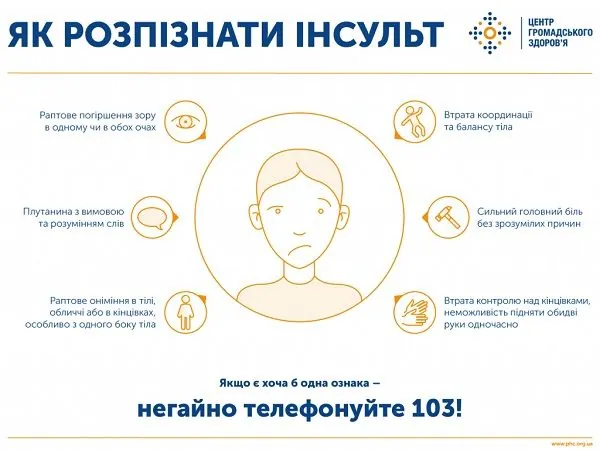How to recognize a stroke: Ukrainians reminded of dangerous symptoms
Kyiv • UNN
The Ministry of Health has introduced a simple way to remember the symptoms of stroke under the acronym “BRAIN”. Doctors remind of the importance of a quick response within the first 4.5 hours after the onset of symptoms.

During World Stroke Week, Ukrainians were reminded of the symptoms of the disease and told how to recognize them, UNN reports with reference to the Ministry of Health.
Details
Stroke symptoms occur suddenly. They are easy to recognize by the abbreviation Cerebral Palsy:
M (language) - illegible, incomprehensible and confusing
O (face) - asymmetrical facial expression, inability to smile
Z (dizziness) - disturbance of balance and coordination, dizziness, staggering
O (eyes) - impaired vision, double vision
K (limbs) - numbness or weakness of the limbs, it is difficult to raise and hold both arms or legs at the same time

What to do if you have symptoms:
call for emergency medical assistance, describing in detail the person's condition - the team will deliver the patient to the nearest facility with the appropriate NHSU contract;
record the time of onset of stroke symptoms to calculate the window of therapeutic opportunities - 4.5 hours.
Stroke diagnosis and treatment are free of charge under the Medical Guarantee Program.
Add
Cardiovascular disease is the leading cause of all deaths in Ukraine (67%). By this indicator, our country remains one of the European leaders.
In particular, almost 97,000 strokes were registered in Ukraine in 2017. So, we remind you of the main signs of a brain stroke, which should be followed by an immediate call for emergency assistance. And we hope that our advice will help improve these statistics.
Stroke: causes and types
A stroke is an acute cerebrovascular accident that results in damage to a part of the brain. Stroke is most often a complication of hypertension and develops against the background of a sharp increase in blood pressure.
There are two types of stroke:
- hemorrhagic, caused by a ruptured cerebral artery;
- ischemic, when the artery that supplies blood to the brain is blocked by a blood clot or spasms.